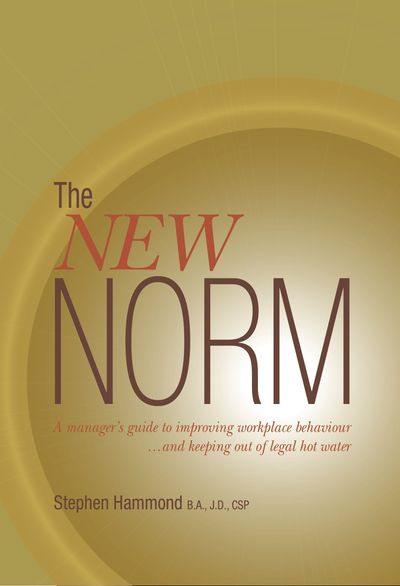Chapter thirty four
THE NEW NORM wants to be reasonable and to remedy a problem
When it comes to workplace behaviours in the realm of human rights, such as sexual harassment or discrimination based on religion, the notion of “reasonableness” is big. Part of that reasonableness is finding a remedy for a problem, not just punishment.
Hence financial awards for Canadian human rights cases are so much smaller than in the U.S. I noted this in Chapter Twenty One, where the harassed employee got less than she wanted because she didn’t accept the company’s offer of staying on with little or no contact with her harasser.
Let’s look at another case where a different kind of remedy was offered.
Ismaeil Karbalaeiali was a driver for the Vancouver Trolley Company for seven years. One day the company’s operations manager Kristy Bentley posted on the company’s "humour board" a satellite picture of a section of the earth that (due to the configuration of light and shadow) also resembled a person's buttocks. The Middle East was situated where the anus would be. The words at the bottom of the picture stated, "No wonder the Middle East is in deep shit."
Karbalaeiali is originally from Iran and he took offence to this joke. However, once she found out it bothered him, Bentley took down the picture, apologized many times and wrote him a letter of apology. Even the president of the company offered his apologies.
However, Karbalaeiali claimed the company didn’t take his complaint seriously and he refused to return to work until Bentley was fired. He went to the B.C. Human Rights Tribunal claiming he was discriminated against due to his place of origin, one of human rights’ protected grounds. The company filed a preliminary motion to dismiss the action before a full hearing actually took place.
Karbalaeiali was likely looking for a remedy involving an admission of discrimination, a financial award for the hurt he endured as well as pay in lieu of notice. He felt he was being reasonable when he indicated he wanted Bentley gone before he would return.
Just like in Chapter Twenty-two, we have these very strong principles in competition. One states that “management is responsible.” That came up decades ago from the Supreme Court of Canada when referring to human rights complaints. Hence, in this case, management responsibility was not at all in question. Manager Bentley put up the “joke” and never denied it. Therefore, it should be pretty obvious that this company was on the hook.
Also as previously mentioned, another very strong principle involves reasonableness and looking for a remedy. One may think that Karbalaeiali was reasonable when he asked for strong action after he felt offended by a tasteless (or worse) joke posted at work. But in this case, the human rights panel member thought otherwise. In a simple six-page preliminary ruling, this is how she summed it up:
“In response to Mr. Karbalaeiali's complaint that he found a ‘joke’ on the Humour Board very offensive, the respondents removed the picture, the Company president met with Mr. Karbalaeiali to address his concerns, and the perpetrator immediately and sincerely apologized. Unfortunately, this has not been sufficient for Mr. Karbalaeiali to feel appeased.
The purposes of the Code are remedial, not punitive…In my view, the respondents' response has been appropriate and adequate to the allegation of discrimination raised in this complaint. In these circumstances, proceeding to a hearing has little to offer in terms of achieving the purposes of the Code and, in my view, is not an appropriate use of the Tribunal's resources. Therefore, the complaint is dismissed.”
Five months later, Karbalaeiali's application for reconsideration was dismissed, as was his appeal to the B.C. Supreme Court in August 2010. Even if you don’t agree with what the manager or company did in trying to remedy the situation, unfortunately it was Mr. Karbalaeiali who ended up being unreasonable in the eyes of the law.
If you feel there are a lot of complexities, regarding workplace rights and responsibilities, you might be interested in taking my Respectful Workplace online course where I deal with many issues and many cases where we learn about workplace discrimination, harassment and bullying.
The OLD NORM
- when legitimately hurt or upset, won’t see past the hurt to come up with a remedy or get things back to as normal as possible.
- isn’t interested in a reasonable response to an unfortunate incident at work.
- sees things as strictly right or wrong, with no room for compromise.
- gives ultimatums, not listening to reason.
The NEW NORM
- wants to hold people accountable when they behave in an inconsiderate manner, but is willing to listen.
- accepts a sincere apology when it’s given, realizing people are human and make mistakes.
- is willing to offer or accept a reasonable remedy even if he feels aggrieved.
- recognizes sometimes unfortunate things happen at work, but we still have to move on.
Suggestions for the New Norm:
01
Let people make mistakes. If no one at work is ever allowed to make a mistake, no one will dare try something new or expand their horizons. Of course this case was about an offensive joke, so it’s not the new horizons a workplace is looking for, but the principle is the same. As social animals, we share stories, jokes and all kinds of information. Sometimes we do so without thinking of all the consequences and therefore we may be corrected or even disciplined. But if everyone was fired for making a bad joke, there’d be a lot more people out of work.
02
Be willing to move past certain behaviours. Whenever I think about forgiving, I think of the wars around the world where one group of people has done unspeakable atrocities to another group of people. At some point people realize they can keep on fighting, or they can try to move past it. Therefore, when it comes to the workplace, I think we can certainly get past some unfortunate and even greatly offensive comments, jokes or actions. Perhaps education, apologies or other interventions would help. But at some point we have to move on.
03
Accept a sincere apology. Otherwise we hold onto grudges that don’t do any good.
This chapter
lets you know employees and managers need to have a clear understanding of what is reasonable and what is now, when addressing issues of workplace harassment, bullying and discrimination. If you want more understanding of some complex workplace issues, consider reading Chapter 19: The New Norm knows misuse of social media even outside of work is risky.
Purchase a copy of The New Norm, or if you think all your supervisors and managers, could learn many valuable lessons about creating a respectful workplace, free of harassment, bullying and discrimination, you can get volume discounts.
What one reader has to say about Stephen’s book, The New Norm
“When I got up early this morning and headed for my computer here at home, I told myself, ‘Just skim read a few sections of Stephen’s book and get a note back to him.’ I couldn’t do that, Stephen. I read it all – every word. You have taken too long to write this book – Employees and Employers in Canada need to read this.
Stephen will capture your attention in highlighting up to date and interesting headlines which we all have an opportunity to learn from. If you believe you can simply skim read this book, think again! The mesmerizing case studies will leave you yearning to learn the conclusion as any great author should do for their readers. Sincere attention to the messages here can only result in best practices within Canadian workplaces.”
Melinda Heidsma
Executive Director, AiMHi, Prince George Association for Community Living

Respectful Workplace Online Training Course
If you, your employees or your managers want more information,
sign up for my new online training course:
The Respectful Workplace in Canada.
With 10 modules of useful, relevant and current information,
this course can help everyone at your workplace.
This may be the best online harassment training your people will get.
Stephen Hammond is a lawyer turned speaker and consultant in the field of harassment, sexual harassment, bullying and discrimination at work.
The New Norm is Stephen’s third book.
Here’s more information about Stephen.



